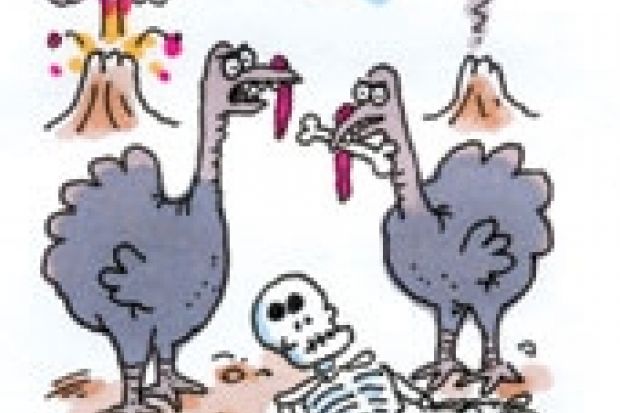Heads have rolled at the fiasco-struck Student Loans Company - but not, however, the head's head. Two senior executives resigned from their posts after a damning report into this autumn's delays in processing loans and grants, which left tens of thousands of students high and dry. Wallace Gray, information and communications technology director, and Martin Herbert, marketing and customer services director, quit on 22 December. However, chief executive Ralph Seymour-Jackson, who faced calls to resign in the wake of the fiasco, will remain in post. The National Union of Students said: "It will be difficult for students and their families to view Mr Seymour-Jackson as part of the solution rather than part of the problem."
Anyone left feeling queasy after eating too much turkey on Christmas Day should be thankful that they did not have to deal with a version of the bird that lived 125 million years ago. Scientists at the University of Kansas have discovered a feathered dinosaur described as a "poisonous turkey", which paralysed its prey rather like a snake. It was reported on 22 December that the discovery provides the strongest evidence yet for the evolution of venom in dinosaurs. David Burnham, a researcher on the project, said: "You wouldn't have seen it coming. It would have swooped down behind you from a low-hanging branch."
Teenagers who have sex before GCSE age are less likely to go to university than their abstinent peers. The findings of a six-year study at the University of Glasgow, reported on 23 December, suggest that young people who "grow up too quickly" are the keenest to quit studying. Both boys and girls think they are more "adult" after losing their virginity, and this alters their ambitions, with university taking a back seat. The study of 5,000 teenagers found that 39 per cent of 16-year-olds who had had sex left school as early as they could, compared with 24 per cent of virgins.
Students from wealthy families should pay up to £30,000 a year to go to university, a respected economist has said. David Blanchflower, a former member of the Bank of England's Monetary Policy Committee, said on December that the "poor have been subsidising the rich" for too long and that the well-off should pay the "market rate". "It's crazy that people are prepared to pay all that money to send their kids to private school, but not to pay the money for university," he said.
The alleged involvement of a former University College London engineering student in the attempted bombing of a US passenger jet has seen the UK's student visa system returned to the spotlight. Umar Farouk Abdulmutallab, a Nigerian, was reportedly "already showing signs of extremist views" when he was granted a visa to study at UCL in 2005. About 1.5 million student visas have been issued in the past eight years. Concerns have been raised that they are being used by terrorists to gain entry to Britain, but universities have also warned that toughening the rules risks putting off international students, who provide a crucial source of income. UCL said the alleged bomber was "well mannered, quietly spoken, polite and able" and "never gave his tutors any cause for concern". He was a full-time student until 2008. He was also president of UCL's Islamic Society in 2006-07, it was reported on 29 December.
After the excesses of Christmas, minds turn to New Year's resolutions, including such perennial favourites as losing weight and giving up booze or fags. But according to psychologists at the University of Hertfordshire, such pledges are pointless - particularly when they are guided by the advice of self-help gurus. Richard Wiseman, who led the Hertfordshire study, said that of 700 people questioned, 78 per cent had failed to achieve their New Year's resolutions. This was often because they focused on the downside of not hitting their goals, he said. He also warned on 29 December that making resolutions at the last minute tended to backfire because snap decisions were less well motivated than longer-standing goals.
Register to continue
Why register?
- Registration is free and only takes a moment
- Once registered, you can read 3 articles a month
- Sign up for our newsletter
Subscribe
Or subscribe for unlimited access to:
- Unlimited access to news, views, insights & reviews
- Digital editions
- Digital access to THE’s university and college rankings analysis
Already registered or a current subscriber?
